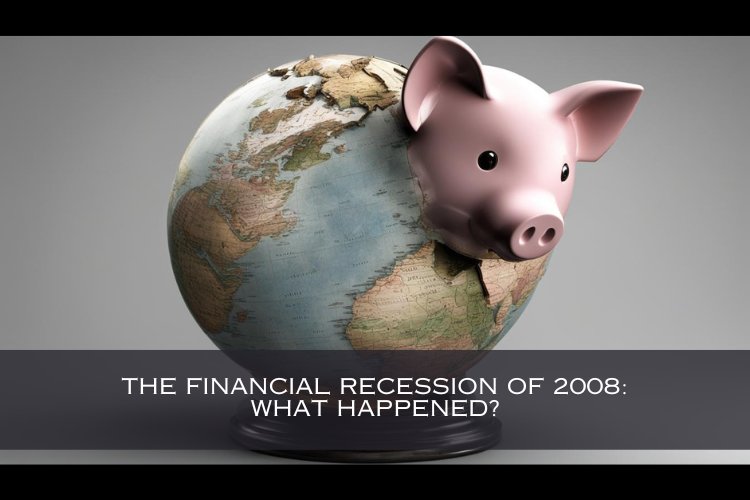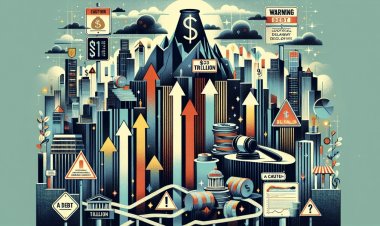The Financial Recession of 2008: What Happened?
Explore the Financial Recession of 2008—a poetic tale of economic tides, waves of change, and the resilience of the human spirit.

The Financial Recession of 2008: What Happened?
It was a time of uncertainty and great financial turmoil. The year was 2008, and the world was about to experience one of the most significant economic downturns in history. The financial recession of 2008, also known as the global financial crisis or the 2008 financial crisis, would have far-reaching consequences that would be felt for years to come.
But what exactly happened? How did the world find itself in the midst of such a devastating crisis? In this article, we will explore the events that led to the financial recession of 2008, its impact on the global economy, and the lessons learned from this challenging period in history.
Key Takeaways:
- The financial recession of 2008 had a significant impact on the global economy.
- The crisis was caused by a combination of factors, including the subprime mortgage crisis and the collapse of major banks.
- The recession led to a stock market crash, a housing market collapse, and a global banking crisis.
- Governments and central banks responded with stimulus packages and financial bailouts.
- The long-term effects of the crisis included its impact on economic growth, financial regulations, and public trust in the financial sector.
Understanding the Causes of the 2008 Recession
Oh, the subprime mortgage crisis! The sound of it sends shivers down the spine, and the memory of it still echoes in the halls of finance. But what exactly was it?
Picture this: a housing bubble so big it had to burst eventually. And when it did, it took down the entire financial sector with it. The subprime mortgage crisis refers to the practice of lending money to borrowers with poor credit, high-risk prospects, and little to no verification of their income. These borrowers were then sold complex financial instruments disguised as sound investments, and as the housing bubble inflated, the problem grew.
With the demand for housing outstripping supply, property prices skyrocketed. Lenders were happy to exploit this situation and give out more and more questionable loans since they believed they could sell them on the secondary market for a tidy profit.
And then the bubble bursts. Homeowners defaulted on their mortgages, lenders were left holding property they could not sell, and financial institutions started to collapse. The banking system was strapped for cash, and people were losing their homes. The crisis had spiralled out of control.
The collapse of the housing market, in turn, led to the collapse of the banking industry, which had become overly reliant on mortgage-backed securities as the main source of liquidity.
"The collapse of the housing market, in turn, led to the collapse of the banking industry, which had become over-reliant on mortgage-backed securities as the main source of liquidity."
The banks had invested heavily in these products, which were supposed to offer secure returns, but when the housing market crashed, the value of mortgage-backed securities plummeted, leaving the banks with nothing to show for their investments. Banks that could not cover their losses were forced into bankruptcy, and the financial crisis unfolded.
That was the banking collapse, and the housing bubble burst, in a nutshell—simple yet catastrophic. It was a wake-up call for the world, reminding it of the dangers of carelessly managed financial systems and the disastrous results of unchecked greed.
Navigating the Storm: The Stock Market Crash of 2008
Oh, the stock market crash of 2008! Such a calamitous event rocked the very foundations of the financial world. It was a moment that shook the very soul of the global economy and marked the beginning of a financial meltdown that would change the course of history.
Investors panicked, stocks plummeted, and the entire market went into freefall. The crisis was so severe that it almost wiped out the entire financial system overnight. It was a time of great uncertainty and fear, a time when the future looked bleak and the world seemed to be spinning out of control.
But what caused this financial meltdown? Some would say it was a combination of factors, including the subprime lending crisis, the housing market crash, and the failure of major financial institutions such as Lehman Brothers. Others would argue that it was simply a case of greed and reckless behaviour on the part of those in charge of the financial industry.
Whatever the cause, the impact of the 2008 stock market crash was felt far and wide. It was not just the financial industry that was affected; the entire global economy suffered. Jobs were lost, homes were foreclosed, and businesses went bankrupt. It was a time of great hardship for many people, especially those who were already struggling to make ends meet.
But amidst the chaos and despair, there were also stories of resilience and hope. Individuals and communities came together to support one another, and businesses adapted to the new economic reality. Governments around the world have implemented measures to stabilise the economy and prevent further collapse.
Today, more than a decade later, we are still feeling the effects of the stock market crash of 2008. The global economy has recovered to some extent, but there are still many challenges and uncertainties ahead. As we navigate the post-recession economy, it is important to remember the lessons we learned from the crisis. We must remain vigilant and proactive to prevent another financial meltdown and ensure a stable and prosperous future for all.
The Collapse of the Lehman Brothers
Oh, the fall of giants! A tale of power, greed, and excess The 2008 recession and the banking crisis were partly caused by the collapse of Lehman Brothers, one of America's most renowned investment banks.
It was a dark moment in the financial world when Lehman Brothers filed for bankruptcy on September 15, 2008. The bank's failure sent shockwaves across the industry and triggered a global financial crisis that would be felt for years to come.
The company, which had been in operation for over 150 years, was once a symbol of Wall Street's success and prosperity. However, the bank's aggressive expansion into risky subprime mortgages and the housing market proved to be its undoing. As the market began to sour, Lehman Brothers found itself holding billions of dollars in toxic assets and was unable to meet its financial obligations.
The bank's collapse was a turning point in the financial crisis, and its impact was felt all over the world. Lehman Brothers had been a significant player in the global financial system, and its bankruptcy sparked a panic in the markets, leading to a credit freeze and liquidity crisis.
The collapse of Lehman Brothers had a domino effect on other financial institutions, including Merrill Lynch and AIG, ultimately leading to a profound banking crisis that threatened the stability of the global financial system.
|
Impact of Lehman Brothers Bankruptcy |
Cause |
|
Massive job losses, especially in the financial industry |
Lehman Brothers' aggressive expansion into the subprime mortgage market and the housing bubble ultimately led to its collapse |
|
Widespread panic and uncertainty in the financial markets |
The bank's inability to meet its financial obligations due to its large exposure to toxic assets |
|
A credit freeze and liquidity crisis |
The domino effect of Lehman Brothers' bankruptcy on other financial institutions, leading to a profound banking crisis |
Following the collapse of Lehman Brothers, governments and central banks around the world scrambled to prevent a total financial market collapse. They implemented a series of unprecedented measures, including bailout packages and stimulus plans, to stabilise the economy and restore confidence in the financial markets.
The collapse of Lehman Brothers was a stark reminder of the dangers of unbridled greed and hubris in the financial industry. It sparked a global conversation on financial regulation and the need for more oversight and transparency in the banking sector.
Today, more than a decade after the financial crisis, the legacy of Lehman Brothers lives on. It serves as a cautionary tale of the consequences of unchecked risk-taking and reminds us of the importance of responsible financial practices in maintaining a stable economy.
The Housing Market Crash: A Tale of Greed and Excess
As we explore the causes and consequences of the 2008 financial crisis, it is impossible to overlook the housing market crash. This momentous event, triggered by greed and excess, had a significant impact on millions of homeowners and investors around the world. Let's take a closer look at what happened.
The housing market crash was the result of a perfect storm of factors. Banks were providing subprime mortgages to people who could not afford them, leading to a housing bubble that eventually burst. As defaults and foreclosures increased, the value of homes plummeted, leaving many people with homes worth less than what they owed on their mortgages.
"Owning a home is a keystone of wealth—both financial affluence and emotional security." Suze Orman
The impact of the housing market crash was felt far and wide. Homeowners lost their homes, investors lost their money, and the economy suffered. The unemployment rate soared as the construction industry ground to a halt, with many people struggling to find work or make ends meet.
But the effects of the housing market crash went beyond just the financial impact. It also shattered the dreams and aspirations of many Americans who believed that owning a home was the key to the American Dream. The emotional toll of losing one's home cannot be understated.
The Aftermath of the Housing Market Crash
The housing market crash led to a significant decline in housing construction and home prices, which lasted for several years. According to the Case-Shiller Home Price Index, home prices fell by 33% from their peak in 2006 to their trough in 2012.
|
Year |
Home Prices (Index Score) |
|
2006 |
206.52 |
|
2007 |
196.97 |
|
2008 |
172.15 |
|
2009 |
147.99 |
|
2010 |
154.36 |
|
2011 |
141.65 |
|
2012 |
133.68 |
The housing market crash also had a significant impact on the banking industry, which had been heavily invested in the housing market. As foreclosures and defaults increased, banks were left with a large number of non-performing loans on their books, leading to a credit crunch and liquidity problems.
Overall, the housing market crash was a stark reminder of the dangers of greed and excess. It left a lasting impact on the American psyche and underscored the importance of responsible lending practices and financial regulations.
The Global Banking Crisis
As the financial recession of 2008 took hold, the global banking system entered a period of unprecedented turmoil. Banks faced a credit crunch, with lenders reluctant to extend loans for fear of defaults. The crisis forced many financial institutions to write off billions of dollars in bad debts, leading to liquidity problems and, in some cases, collapse.
The banking crisis was triggered by a number of factors, including the subprime mortgage crisis, which saw risky home loans issued to borrowers who were unlikely to repay them. These loans were packaged into mortgage-backed securities and sold to investors, including major banks, who believed they were investing in secure assets.
"The banking crisis was triggered by a number of factors, including the subprime mortgage crisis, which saw risky home loans issued to borrowers who were unlikely to repay them."
However, the housing market crash led to a sharp decrease in the value of these securities, causing huge losses for investors and banks. Banks also faced problems due to their own over-leveraging and high-risk investments, including exposure to complex derivatives and securities that proved difficult to value.
|
Impact of the banking crisis |
Examples |
|
Bankruptcy and closure of major financial institutions |
Lehman Brothers, Bear Stearns, Washington Mutual |
|
Government intervention and financial bailouts |
TARP program in the United States, nationalization of some banks in the UK and other countries |
|
Loss of savings and investments for individuals and institutions |
Many investors lost money due to the collapse of banks and the drop in stock prices |
|
Ripple effects on the global economy |
The banking crisis contributed to the recession, with widespread job losses and economic instability |
The banking crisis had severe consequences for the global economy, causing a sharp reduction in the availability of credit and leading to a wave of bankruptcies and closures among major financial institutions. Governments and central banks responded by implementing measures such as the TARP programme in the United States and the nationalisation of banks in the UK and other countries.
The crisis highlighted the need for stricter financial regulations and greater oversight of the banking industry. It also demonstrated the interconnectedness of the global financial system, with the collapse of one institution having widespread ripple effects.
The Impact on Jobs and Unemployment
Oh, the impact of the 2008 recession was far-reaching and deep, like a pebble thrown into a pond, creating ripples that echo for years to come. The global economic recession of 2008 had a profound impact on jobs and employment rates.
The financial meltdown caused massive job losses, and the unemployment rate skyrocketed. The recession was characterised by widespread layoffs, businesses closing down, and a freeze in hiring. As a result, millions of people were left without work; the average unemployment rate in the US alone was 5.8% in 2008, increasing to a staggering 9.6% by 2010.
The impact of the economic recession in 2008 was felt across industries and sectors, from construction and real estate to manufacturing and banking. The ripple effect of the housing market crash was particularly devastating. The subprime mortgage crisis and the subsequent housing market collapse led to job losses in the construction industry and related sectors. Housing starts, which peaked at 2.3 million in 2005, fell to an all-time low of 554,000 in 2009.
The impact of the 2008 recession was not just limited to job losses. It also had a significant impact on the quality of jobs available. Many people who lost their jobs during the recession had difficulty finding employment. Many of those who did find work had to settle for part-time or low-paying jobs.
The economic recession of 2008 had a profound impact on people's lives. It was a time of great uncertainty, fear, and financial hardship for millions of families around the world.
The impact of the 2008 recession is still being felt in many parts of the world today. Even as economies recover and employment rates improve, many communities continue to struggle with the legacy of the recession. The lessons learned from this period of economic downturn continue to shape our understanding of global economic systems and the importance of effective intervention in times of crisis.
Government Response and Bailouts
When the financial market collapse was in full swing, the economies of the world were in a state of emergency. Governments and central banks scrambled to find ways to stabilise the economy and prevent further collapse. The response was swift and decisive, with policymakers deploying massive stimulus packages and financial bailouts.
The United States government initiated a $700 billion bailout package that focused on the troubled banking sector. The Troubled Asset Relief Programme (TARP) was enacted to provide financial assistance to banks and other financial institutions that were struggling to stay afloat. The programme's aim was to encourage lending and stabilise the financial system.
Meanwhile, the European Central Bank launched a series of measures aimed at boosting liquidity and protecting the eurozone from the worst of the economic downturn. The bank cut interest rates and implemented quantitative easing to encourage lending and investment.
While the bailouts were controversial, they were largely successful in stemming the tide of the economic crisis. Many of the banks that received bailout funds have since repaid the government, and the financial system has largely stabilised.
"The government response to the economic crisis was critical in preventing a total meltdown of the financial system. Without the aggressive actions taken by policymakers, the recession could have been much deeper and longer-lasting."
There were criticisms from some quarters that the bailouts were a form of corporate welfare and that they disproportionately benefited the wealthy and the financial industry rather than ordinary citizens. However, it is widely agreed that the global financial system would have been far worse off if not for the decisive action taken by governments and central banks.
The long-term effects of the crisis
When the 2008 financial crisis hit, it sent shockwaves through the global economy, triggering widespread fear, panic, and uncertainty. Today, more than a decade later, the effects of the crisis are still being felt in various ways.
The economic fallout
One of the most significant consequences of the 2008 recession was the long-term economic downturn that followed. The crisis sparked a global recession that lasted several years, with many countries experiencing negative GDP growth and high levels of unemployment. Even after the economy began to recover, it continued to exhibit sluggish growth and low productivity, leading some experts to suggest that the crisis had caused lasting damage to the global economy.
Some countries have fared better than others in the years since the crisis. In the United States, for example, the economy has rebounded more quickly than in many other nations. However, even in the U.S., the effects of the crisis linger. One notable consequence has been the widening wealth gap between the top earners and everyone else.
The Regulatory Response
In response to the crisis, governments around the world implemented new regulations aimed at preventing a similar crisis from occurring in the future. In the United States, for example, the Dodd-Frank Wall Street Reform and Consumer Protection Act was passed in 2010, imposing stricter regulations on financial institutions and making it more difficult for them to engage in risky behaviour.
Similarly, the European Union passed a series of regulations known as the Capital Requirements Directive IV, which sought to strengthen the financial sector's resilience and reduce the risk of future crises. However, some critics argue that these reforms were not comprehensive enough and that the financial sector still has too much power and influence.
The psychological impact
Beyond its economic and regulatory consequences, the 2008 financial crisis also had a profound psychological impact on individuals and societies. The crisis eroded public trust in the financial sector, leading many to question the very foundations of the capitalist system. It also caused high levels of stress and anxiety among those who lost their jobs, homes, or life savings.
Today, many people still feel the effects of the crisis, both economically and psychologically. The memory of the meltdown lingers on in the form of heightened caution and scepticism, with many individuals and institutions adopting a more risk-averse approach to investing and financial management.
In Conclusion
The 2008 financial crisis was a defining moment in modern history, one that shook the global economy to its core and continues to reverberate through society today. While some progress has been made in addressing the root causes of the crisis and preventing future meltdowns, the long-term effects are still being felt. By understanding the consequences of the crisis, we can gain important insights into the nature of the economic and financial systems that shape our lives.
Lessons learned and resilience
The economic recession of 2008 was a stark reminder of the fragility of the global financial system. It exposed weaknesses in financial regulations, risk management, and even human nature itself. But from the depths of that crisis, we learned valuable lessons about resilience, innovation, and the power of collaboration.
The causes of the recession were complex and interconnected, stemming from a combination of factors that included the subprime mortgage crisis, the housing market crash, and the global banking crisis. These events triggered a financial meltdown that sent shockwaves through the global economy, resulting in widespread unemployment, business closures, and economic hardship.
But despite the severity of the crisis, we saw remarkable resilience from individuals and communities who refused to give up hope. We saw entrepreneurs and innovators who found new ways to create value and contribute to the economy, even in the face of adversity.
The lessons learned from the 2008 financial crisis are numerous and varied, but some of the most important include the importance of risk management, the need for transparency and accountability, and the power of collective action. Governments and central banks around the world responded with unprecedented levels of cooperation and collaboration, implementing fiscal and monetary policies aimed at stabilising the financial system and preventing another crisis.
For many people and businesses, the financial crisis of 2008-induced economic recession was a painful and difficult time. However, the resilience and determination shown during that time have left us with a legacy of lessons and insights that will serve us well in the future. By embracing innovation, collaboration, and a commitment to transparency and accountability, we can ensure that we are better prepared to weather any economic storm that may come our way.
Navigating the Post-Recession Economy
As we continue to emerge from the aftermath of the housing market crash and Lehman Brothers' collapse, it's important to remain informed and adaptable to the changes in the global economic landscape.
The housing market crash left many homeowners in a precarious financial situation, with plummeting home values and the inability to sell their homes. However, as the market has slowly recovered, it's important to consider the current state of the market before diving into any investments. It's important to research market trends and consult with a financial advisor before making any significant investments.
While the collapse of Lehman Brothers served as a catalyst for the financial meltdown, many of the issues that led to the crisis still exist in the financial sector. It's essential to remain cautious with financial investments and adhere to sound financial principles.
Additionally, it's important to stay informed on any regulatory changes put in place to prevent a similar crisis from occurring in the future. Keeping up with financial news and market trends can give individuals and businesses a competitive edge in navigating the post-recession economy.
Navigating the Post-Recession Economy in Short Poems
Oh, how the world shook with fear.
As the economic meltdown drew near,
The crash hit hard, and the pain was real.
And now, we must all learn to heal.
As we move forward to a new dawn,
It's time to pick ourselves up and carry on.
To navigate the post-recession economy,
With resilience, adaptability, and camaraderie.
Investing with caution
Investing is not for the faint of heart.
But with caution and research, you can start.
Looking for opportunities that make sense,
With diversified portfolios as your defence.
Managing personal finances
The budget is king in times like these.
Tracking expenses and spending with ease
Saving for emergencies and cutting costs
Can help make your finances less of a loss.
Adapting to a Changing Landscape
The world has changed, and so must we.
Adapting to shifts in the economy,
With innovation, creativity, and grit,
We can weather any storm that hits.
Conclusion
As we reflect on the causes and consequences,
Of the financial meltdown and the recession's ferociousness,
We must remember the lessons we've learned.
And the resilience we've shown in our recovery firm
It's up to us to navigate the post-recession economy,
With determination and a sense of camaraderie,
To build a better world for all to see,
And to leave behind this era in history.
FAQ
What was the financial recession of 2008?
The financial recession of 2008, also known as the global financial crisis or the 2008 financial crisis, was a significant downturn in the global economy that began in 2008. It was triggered by various factors, including the subprime mortgage crisis, the housing bubble burst, and the banking collapse.
What were the causes of the 2008 recession?
The 2008 recession was caused by several factors, including the subprime mortgage crisis, where banks provided mortgages to borrowers with poor credit, leading to a housing bubble that eventually burst. Additionally, the collapse of major banks and financial institutions contributed to the downturn in the economy.
How did the stock market crash in 2008 impact the economy?
The stock market crash of 2008 had a significant impact on the economy. It led to widespread panic and uncertainty, causing investors to lose confidence and resulting in a downturn in consumer spending and business investment. The crash further exacerbated the ongoing financial crisis.
What role did Lehman Brothers play in the 2008 recession?
Lehman Brothers, a major investment bank, played a significant role in the 2008 recession. The collapse of Lehman Brothers in September 2008 was a pivotal event that intensified the global financial crisis. It led to increased fears about the stability of the financial system and triggered a widespread banking crisis.
How did the housing market crash contribute to the recession?
The housing market crash was a key factor in the 2008 recession. The collapse of the housing market led to a decline in property values, foreclosures, and a loss of confidence in the financial system. This, in turn, had a negative impact on consumer spending, investment, and overall economic growth.
What was the global banking crisis during the 2008 recession?
The global banking crisis during the 2008 recession refers to the widespread problems faced by financial institutions. It included a credit crunch, where banks became hesitant to lend money, and liquidity problems, making it difficult for businesses and individuals to access credit. These issues further deepened the economic downturn.
How did the 2008 recession impact jobs and unemployment?
The 2008 recession had a significant impact on jobs and unemployment. As businesses faced financial difficulties, they had to lay off workers or reduce their workforce. This led to a rise in unemployment rates and increased financial hardships for individuals and families.
What were the government responses and bailouts during the recession?
Governments and central banks implemented various responses and bailouts to combat the recession. These included stimulus packages to boost economic activity, financial bailouts to stabilise troubled banks, and regulatory reforms to prevent future crises. These measures aimed to restore confidence and mitigate the effects of the financial meltdown.
What were the long-term effects of the 2008 financial crisis?
The 2008 financial crisis had long-lasting effects on the global economy. It resulted in slower economic growth, increased financial regulations, and a loss of public trust in the financial sector. Governments and institutions implemented measures to prevent a similar crisis from occurring in the future, such as stricter banking regulations and improved risk management practices.
What lessons were learned from the 2008 recession?
The 2008 recession taught us valuable lessons about the importance of responsible financial practices, risk management, and the need for effective regulation in the financial sector. It also highlighted the resilience of individuals, businesses, and economies in recovering from such a significant crisis.
How do we navigate the post-recession economy?
Navigating the post-recession economy requires careful consideration and adaptability. It is important to stay informed about market trends, manage personal finances responsibly, and seek opportunities for investment and growth. Adapting to changes in the global economic landscape is crucial to ensuring stability and success in the post-recession era.
TradeFxP Features
If you choose to be a self-employed retail trader, here are a few things we offer:
- The best trading platform
- No Requotes
- Lowest Spreads
- High-level liquidity
- Interbank connectivity
- Pure STP/DMA/ECN
- Free signals
- Best support
- Crypto Wallet and withdrawals / Deposits (USDT)
- Robust CRM
- TradeFxP wallet
- Once click withdrawal
- Multiple payment options
- Local offices to walk in
- Free VPS
- Free Video Chat / Virtual Meetings
- And many more…
If you choose to be a part of our managed account programme,
- All of the above +
- 1-2% Daily Profits
- High-level risk management
- Capital protection
- Only 30% of the capital used
- Negative balance protection
- Our fee is from the profits only
- Monthly profit withdrawal
- Wallet system – Use it like Phonepe, or Google Pay
- Crypto wallet and withdrawals / Deposits (USDT)
- Live monitoring
- MyFxbook Live monitoring
- Copy Trading
- And many more…
Optional: If you do not withdraw your profits for 2 months, our system will use those profits to trade and will keep your 100% capital safe and secure for margin purposes. This is optional, and if you choose not to be a part of it, you can withdraw your profits from the first month itself.
Why 1-2% daily? Can't your managed forex account earn more?
Yes, we can! Remember: greed may be good in the beginning, but in the end, it will destroy everything. You and I know that! Many droplets make an ocean! Join the Managed Account Programme and sit back for six months, then look at your account. You'll see that our strategy is good and the best. Do you know what I mean?
If you choose to be a part of us as an introducing broker (IB) or channel partner,
- Industry-best rebates
- Local Office support
- Staff support
- Marketing support
- Marketing materials
- And many more…
Having said that,
You can join our Forex Managed Account programme and earn 1-2% profits daily. See for yourself by clicking the below link.
Have a great journey, and may you catch some big waves on your way to prosperity!
To see Ai Forex Trading for real, use these credentials.
- Low-risk strategy:
- Mt4: 112018
- Pw: Allah@101
- Server: TradeFxP live,
1. To read why you should be with us, click here.
2. To open an account, click here.
3. To see our regulation certificate, click here.
4. To see our news with the IFMRRC, click here.
5. For claims, click here.
6. For the main site, click here.
7. For blogs and articles, click here.
8. Main Website: www.TradeFxP.com



 admin
admin 










